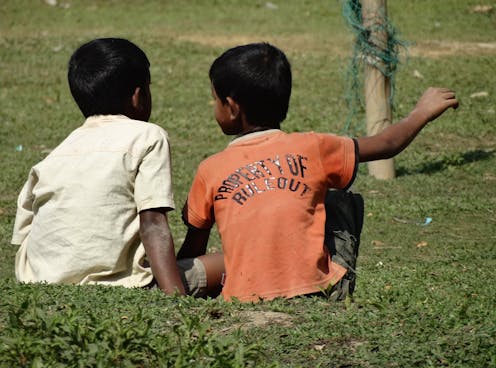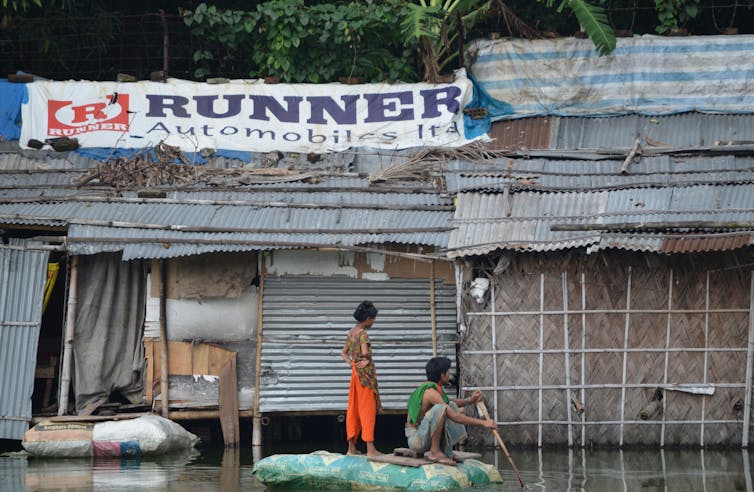
For the past five years, the GANGS project, a European Research Council-funded project led by Dennis Rodgers, has been studying global gang dynamics in a comparative perspective. When understood in a nuanced manner that goes beyond the usual stereotypes and Manichean representations, gangs and gangsters arguably constitute fundamental lenses through which to think about and understand the world we live in.
In this article, Sally Atkinson-Sheppard worked closely with Sharif to write the story of his journey from becoming a gang member in war-torn Bangladesh to a human rights worker and advocate for street children’s rights today. His story is one of overcoming exceptional adversity and drawing on his past experiences to do good in the world today.
It’s the afternoon in Dhaka, Bangladesh. I am sitting in an office on the fourth floor of a tower block in a northern part of the city. The window of the room is ajar, and I can hear Dhaka City rumbling below, the now familiar noise of car horns, rickshaw bells and people’s voices seeping into the office. It is summer and the air is hot, dense and stifling, with dust streaming in through the open window. Opposite me sits Sharif, a now 60-year-old prominent human rights worker and participant of my doctoral research.
Our first meeting was in July 2015. It became one of many, and the start of a significant working relationship and friendship. This connection became an essential part of my doctoral study and, years later in 2023, led to an exploration of Sharif’s life through hours of interviews as part of the GANGS Project.
During these conversations, Sharif and I discussed his childhood and how he overcame great adversity, how war and conflict meant that he was forced to live on the streets at 14, leading him to become involved with criminal gangs as a means to survive.
Sharif’s story challenges many of the dominant themes in gang research. Unlike common narratives, Sharif did not come from a family with a history of gang involvement, nor was he surrounded by violence. Instead, Sharif chose to leave his family home to support their survival in the aftermath of the 1971 War of Independence.
Exploring gang lives in Bangladesh
Research into gangs is expansive and global. Studies have demonstrated how gangs exist in most countries around the world, exploring the nature of these criminal enterprises and their relationship with violence and the state. Yet, there remains limited exploration of gangs in South Asia, particularly in Bangladesh.
Bangladesh, one of the world’s most populous countries, exhibits many conditions in which gangs are known to grow and thrive.

The fractured and violent political situation, widespread poverty, and the country’s vulnerabilities to natural (and man-made disasters) have created a widespread and complex environment for gangs and organised crime. Gangs in Bangladesh are varied and multi-faceted. Research suggests that they operate on the streets and in collaboration with the state. There are also youth gangs, and gangs that are associated with student wings of political parties.
There is also an additional factor: the emergence of Bangladesh as a relatively new nation. In 1971, West and East Pakistan engaged in a war known as the Bangladesh liberation war, leading to the creation of Bangladesh that same year.
The impact of the Bangladesh War of Independence
The war and its aftermath were particularly important in Sharif’s upbringing. He was born in rural Bangladesh, in a large town, close to the border with India. He lived with his mother, father and 7 siblings and before the 1971 war, he recalls stability and happiness within his family. That was until Sharif’s father was killed by the Pakistani military earlier in the war. From then on, Sharif and his family did everything they could to survive. At the age of 14, amid the chaos and trauma of war, Sharif left the family home. He explained how:
I only had one single shirt, but it was torn in so many places. I had only one lungi but it was also torn in two places and I had to tie it together to keep it from falling down. Everything was completely uncertain. If I managed one meal in a day, I felt like I had survived but then we had to think about the next meal, how to fight for that. To earn a meal a day was survival. We didn’t have any real plan, just to survive each day and get to the next one. That was our life then.

During this time, Sharif tried to become a freedom fighter – members of the Bangladeshi military, paramilitary and civilians who formed part of the resistance movement in the 1971 War of Independence. But his age prevented him from joining them. On several occasions he was captured by the Pakistani army, he travelled to India, attempted entry into refugee camps, was interrogated by the Indian police and faced enormous economic and emotional challenges, including coping with his sister’s capture and rape by the Pakistani military.
“No one could realise how bad it was at the beginning”
Sharif then ended up living on the streets at a railway station in Bangladesh and became involved with criminal gangs in order to survive. To stay alive, Sharif had to find shelter (often on a roof top at the station), food, solidarity (which he found among fellow street children) and money. To achieve the latter, he worked at a tea stall, supplying “cha” to the station visitors. It is there that he grew aware of the criminal gangs who frequented the station. Sharif grew closer to these groups, which were embedded in broader Bangladeshi society and had connections with corrupt politicians and the police.
Sharif laid out the different crimes committed by these gangs – theft, robbery and extortion – and how affiliation with these groups allowed him to earn an income. He explained hierarchies among the groups, with leaders, sub leaders and vulnerable young people, like Sharif, embroiled in the lowest echelons of these criminal enterprises. Sharif explained how:
It is the leader’s job to get the boys together and then to share the responsibility of who will do what. There is a small leader of the group and then bigger bosses. The orders come from the older bosses. The number of older bosses depends on the part of town, say a part of the town has a leader and he has subgroups. But it depends on how big and economically viable the area is.
Sharif went on to describe the ways in which gangs interact with wider society and the state:
The leaders don’t live on the streets, they live in society, they give shelter [protection] to influential people. The leader is like a person in a circus, he commands everyone to play. He is not playing himself on the streets, rather he is playing on the back screen. Many of those leaders are socially accepted and they are known as committed to society, they do a lot for the society. People in society give them shelter [protection]. The leaders don’t get arrested by the police; they are socially accepted.
While living on the streets Sharif became involved in various types of crime.
“No one can talk about some of the things [involvement in crime]. No one could realise how bad it was at the beginning, and how much I have carried over in my next life from this experience, the guilt, the pain. It is really difficult for me to explain; really difficult for someone to understand.”
He also described the vulnerability he faced:
“These vulnerable kids, they do not have the chance to feel guilt. They barely have time to think. Now, as an adult all I do is think, think about today, tomorrow, think about what will happen to me and my family in 5-years’ time. But when I lived on the streets, I could barely even see tomorrow. All I could focus on was my survival. What other choice did I have?”
Questioning life on the streets
Stability returned to Bangladesh following the War of Independence and after several years Sharif started to question his life on the streets. He described how:
“Unfortunately or fortunately I have some kind of foresightedness, I knew there was a different type of life and things in the group became more and more difficult. Every day there was some kind of threat, from the police, or from the leader. There was always some issue with the police, often because our leaders didn’t give them enough money, then the police would be really rude to us. Also, if you wanted to leave the group the leader would stop paying the police for protection of the member of the gang and the police would run after you. So, you ended up having to rejoin the group. I thought to myself: ‘Okay, if I want to leave the group then I have to leave this place’. And I did it. Luckily, a man helped me. He had lost two children in the war of 1971; both had been killed by the military. He was so kind to me, and I started living with his family. He was a train driver. My background from my life before the streets meant that I always read a lot, even when I was sheltering in the broken coaches, I read old newspapers. That was something which gave me the insight of a different life.”
Sharif explained how, with the help of the train driver, he managed to leave the streets and begin a new life. The process was incredibly challenging, he struggled to survive and spent months trying to locate his family. When he finally found them, Sharif slowly began to rebuild his life. He returned to the family home and sought employment. One of his first jobs was working as a tutor. Sharif then went on to study at school and university, secured a job in the Bangladeshi government and ended up working for several NGOs. He now works as a prominent human rights worker and uses his experience to advocate on behalf of street children and vulnerable young people living in Bangladesh.
Children’s lives “are subject to other people’s decisions”
There are many parallels with Sharif’s story, gangs and organised crime in Bangladesh today. My recent research illustrates how mafia-type groups controlled urban areas in the past and continue to do so today.
These groups still engage in a variety of crime and violence, often in collaboration with the state. My doctoral research explores this relationship and questions extant notions of gangs which are largely derived from Global North contexts. From a Global North lens gangs are street-based groups engaged in crime and violence but distinctively different to organised crime. In places like Bangladesh, gangs are inherently associated with organised crime and corrupt members of the state. In addition, my research proposes that young people – like Sharif, who become involved in the lower echelons of these criminal enterprises, should be conceptualised as ‘illicit child labourers’ rather than gang members, which risks criminalising them, or as victims, which denies their agency and capacity to make choices.
There is an urgent need for far greater awareness of this issue and better protection for these children. As Sharif explained, they face extreme poverty, endemic abuse and have little control over their lives: “They are subject to other people’s decisions”.
This article draws on research partly funded by Dennis Rodgers' “Gangs, Gangsters, and Ganglands: Towards a Global Comparative Ethnography” (GANGS) project, financed by a European Research Council Advanced Grant (no. 787935).
This article was originally published on The Conversation. Read the original article.







